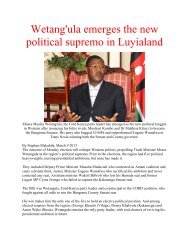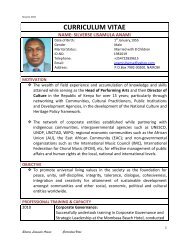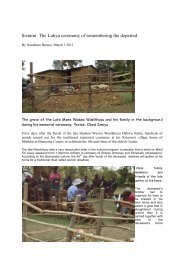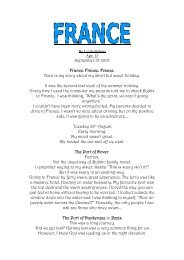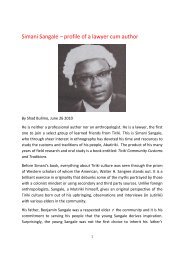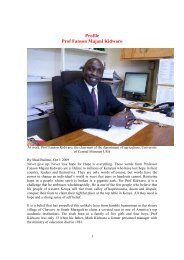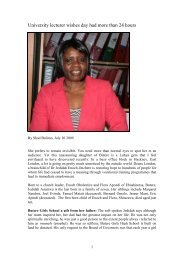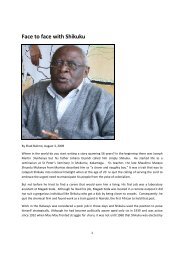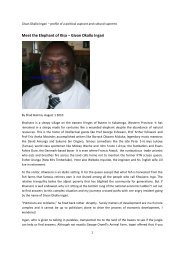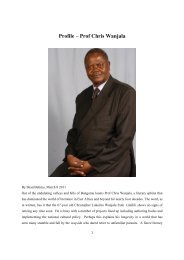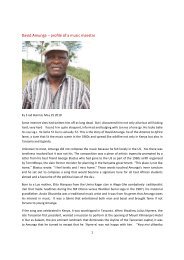You also want an ePaper? Increase the reach of your titles
YUMPU automatically turns print PDFs into web optimized ePapers that Google loves.
<strong>Jonathan</strong> <strong>Niva</strong>: <strong>Profile</strong>:<br />
<strong>Niva</strong> was born on May 16, 1942 to Petro Muchuma and Rebecca<br />
Inyanji of Samitsi, Malava, Kakamega. On the day of his birth a<br />
missionary teacher at Samitsi Primary School, Festo Likhaya from<br />
Isukha, was called to come and offer prayers for the newborn. Holding<br />
the baby in his hands, Festo prayed, “…Niiba Nyasaye noyanza, lekha<br />
omwana wuno amenye…(God, IF you Will, let this child live)…” The<br />
baby was named <strong>Niva</strong> and was destined for great things.<br />
Since Petro had lost several children at young ages, the prayer came<br />
at an appropriate time. His only surviving children at this time were<br />
Jediddah Khevali and Yosiah (Josiah) Liru, first and second (born),<br />
respectively. <strong>Niva</strong> was one of those who would eventually survive early<br />
child mortality.<br />
Sadly, <strong>Niva</strong>’s mother was struck by lightning while “mudding” a new<br />
family house. She died on the spot.<br />
His elder brother,Yosiah and immediate follower, Lebanon<br />
Thaddeus, recall playing “elisubo” (papers and pieces of cloth tied<br />
bound together with strings into a ball) with <strong>Niva</strong> during their early<br />
years. They considered themselves lucky whenever they found a<br />
tennis ball that they used as a football. As fate would have it, Yosiah<br />
was left physically challenged after a bout with polio. The most he<br />
could do was watch his brother play his favorite game. Lebanon’s<br />
enthusiasm for soccer waned with time but <strong>Jonathan</strong> was different.<br />
Neighboring schools or teams were known to “steal” him on his way<br />
home from school to play for them. His services were in high demand.<br />
Some would bundle him from the Siimba (a house for unmarried<br />
young men) he slept in. He would be guided through the thickest of<br />
bushes and marshes to a place he had never gone before. His<br />
abductors promised to return him home in one piece after he played<br />
for them. His brothers and cousins were, on several occasions, at a<br />
loss to explain to the fire-breathing Petro the whereabouts of his son.<br />
Muchuma would not rest that day until he hunted down his son and<br />
returned him home. And on those occasions, <strong>Niva</strong> was punished for<br />
“agreeing to be stolen” which resulted skipping school and failing to<br />
complete his domestic chores.<br />
Nonetheless, <strong>Niva</strong>’s road to greatness turned to a highway when he<br />
joined Sigalagala College . He no longer had his father raining hail and
imstone on him. His father used cypress tree branch to cane<br />
him. Dad confided in me that the resilience of the cypress canes,<br />
compared with several other trees around, provided his father,<br />
Petro, with more time to “rain” discipline in him before the sticks<br />
broke.<br />
In his “Fond Memories of Coach <strong>Niva</strong>,” Nelson O. Obota describes<br />
<strong>Jonathan</strong> as “…symbol of all that a player should be: strong, tough,<br />
energetic, vibrant, charismatic and disciplined” He goes on to say that,<br />
“…to capture his greatness; one needs to got a glimpse at the calibre<br />
of people he played alongside or against – Joe Kadenge, Daniel<br />
Anyanzwa, Anthony Mukabwa, Johnstone Madegwa, William “Chege”<br />
Ouma, Stephen Yongo, James Siang’a. But he, <strong>Niva</strong>, stood out like a<br />
colossus…”<br />
In 1972, one of Simba’s remarkable years, he took over the national<br />
team as coach-cum-player from a German coach, Eckhard Krautzun,<br />
barely three weeks before the African cup of Nations. This was the first<br />
time ever for Kenya to qualify for the tournament. After<br />
beating Ethiopia and Mauritious, Kenya lost 1-2 to The Indomitable<br />
Lions (Cameroon). They drew 1-all with both Togo and Mali, the losing<br />
finalist. Because of this loss, Kenya's Harambee Stars was locked out<br />
of the semi final. Of the three goals for Harambee Stars, Simba wa<br />
Kenya (the Lion of Kenya) had two to his credit. He was voted the best<br />
player of the tournament. Thus the team had at least one consolation<br />
trophy to to take back home.<br />
Back home, the story was the same. Ya Mayeye [ Luhya for (the lion)<br />
with a mane] had scored 27 goals in the National League. He scooped<br />
the “Player of The Year” award.<br />
His nickname variants helped determine on which assignment he was.<br />
He was called Simba, the Kiswahili version for Lion, when on National<br />
assignments and just “Ya Mayeye” when Abaluhya or (later) AFC<br />
Leopards were mauling away at their opponents. I guess Leonard<br />
Mambo Mbotela had a way of interchanging the two, in addition to<br />
“<strong>Niva</strong> na mpira…” (<strong>Niva</strong> with the ball) without biting his tongue during<br />
his exhilarating radio broadcast of matches. Mambo’s broadcasting<br />
style took everything happening in a stadium to the hearts of his<br />
distant frenzied listeners. Leonard Mambo is yet to be rivaled at the<br />
art.<br />
At one time, when the Kenya National Team paid a courtesy call to<br />
President Jomo Kenyatta at the State House, Nairobi , the President
caused laughter when he asked <strong>Niva</strong> whether his name was specifically<br />
tailored for football or whether it was his real, natural name. <strong>Jonathan</strong><br />
answered that it was his real name.<br />
Simba hung up his boots in 1978.<br />
Source: http://www.nivaunltd.com/site/en/about/jonathan.html



